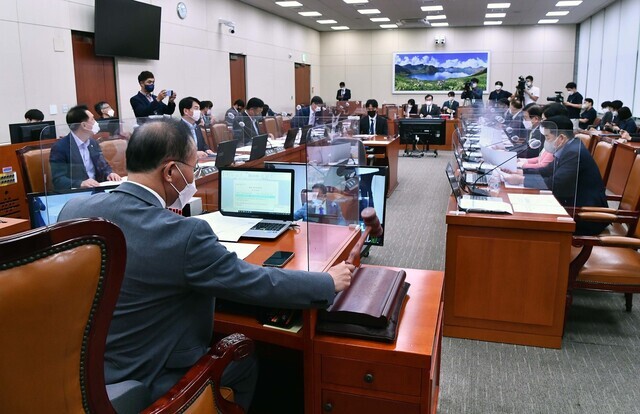hankyoreh
Links to other country sites 다른 나라 사이트 링크
Korean legislative committee adopts resolution denouncing US EV tax credit snub

A South Korean National Assembly standing committee passed a resolution voicing concerns about the US Inflation Reduction Act (IRA), which includes discriminatory measures targeting South Korean electric vehicles (EVs).
The National Assembly Foreign Affairs and Unification Committee held a plenary session Tuesday morning, during which it adopted a revised and supplemented form of a resolution sponsored by Democratic Party lawmaker Lee Won-wook, which urges the “prohibition of US tax support discrimination in the areas of imported electric vehicles and batteries.”
With a similar resolution also slated for presentation at a meeting of the parliament’s Trade, Industry, Energy, SMEs and Startups Committee that afternoon, the two resolutions are expected to be combined for presentation before the National Assembly’s regular session.
In its resolution, the Foreign Affairs and Unification Committee said, “The National Assembly expresses serious concerns about content in the US government’s Inflation Reduction Act that discriminates between North American and imported electric vehicles and batteries in its electric vehicle taxation legislation.”
“While the law in question purports to be aimed at reducing the price burden on American citizens and promoting the use of EVs as a response to the climate crisis, it is unquestionably an action that discriminates on the basis of nationality against companies that are working to respond to the global issue of climate change,” it stressed.
It also said that the terms were “contrary to the approach of reducing and eliminating barriers to South Korea-US bilateral trade and investment that is pursued by the South Korea-US Free Trade Agreement.”
“The US government must confront the fact that this policy change causes enormous damages and burdens for South Korea and other key trading partners, and that is an action that reduces the US’ own credibility overseas,” it urged.
The committee also called on the South Korean government to “pursue active negotiations with the US government to ensure that South Korean companies are not subject to unfair treatment or damages in the process of exporting electric vehicles and batteries to the US.”
On Aug. 16, US President Joe Biden signed the Inflation Reduction Act, which included measures in response to climate change, increased support in the area of health, and higher taxes for major corporations.
In its approach to expanding EV supplies in response to climate change, the law restricted the scope of tax credits for vehicles finished in the US or North America. This was a blow to automakers in South Korea and other countries that export EVs to the US market.
A day earlier, the South Korean government sent a delegation to the US with members including the Ministry of Trade, Industry and Energy international trade affairs director general, Ahn Seong-il; the Ministry of Economy and Finance trade issue countermeasure team leader, Son Woong-gi; and the Ministry of Foreign Affairs bilateral economic diplomacy bureau director, Lee Mi-yeon.
The members were scheduled to remain in the US until Wednesday, during which time they would be visiting Congress and key US executive institutions, including the Office of the US Trade Representative, Treasury Department, and Commerce Department to communicate South Korea’s concerns about the EV tax incentive system terms in the Inflation Reduction Act and discuss possible supplementary measures.
By Jung In-hwan, staff reporter
Please direct questions or comments to [english@hani.co.kr]

Editorial・opinion
![[Guest essay] Amending the Constitution is Yoon’s key to leaving office in public’s good graces [Guest essay] Amending the Constitution is Yoon’s key to leaving office in public’s good graces](https://flexible.img.hani.co.kr/flexible/normal/500/300/imgdb/original/2024/0416/8917132552387962.jpg) [Guest essay] Amending the Constitution is Yoon’s key to leaving office in public’s good graces
[Guest essay] Amending the Constitution is Yoon’s key to leaving office in public’s good graces![[Editorial] 10 years on, lessons of Sewol tragedy must never be forgotten [Editorial] 10 years on, lessons of Sewol tragedy must never be forgotten](https://flexible.img.hani.co.kr/flexible/normal/500/300/imgdb/original/2024/0416/8317132536568958.jpg) [Editorial] 10 years on, lessons of Sewol tragedy must never be forgotten
[Editorial] 10 years on, lessons of Sewol tragedy must never be forgotten- [Column] A death blow to Korea’s prosecutor politics
- [Correspondent’s column] The US and the end of Japanese pacifism
- [Guest essay] How Korea turned its trainee doctors into monsters
- [Guest essay] As someone who helped forge Seoul-Moscow ties, their status today troubles me
- [Editorial] Koreans sent a loud and clear message to Yoon
- [Column] In Korea’s midterm elections, it’s time for accountability
- [Guest essay] At only 26, I’ve seen 4 wars in my home of Gaza
- [Column] Syngman Rhee’s bloody legacy in Jeju
Most viewed articles
- 1[Guest essay] Amending the Constitution is Yoon’s key to leaving office in public’s good graces
- 2Faith the power of memory: Why these teens carry yellow ribbons for Sewol
- 3[Guest essay] How Korea turned its trainee doctors into monsters
- 4[Editorial] 10 years on, lessons of Sewol tragedy must never be forgotten
- 5US grants Samsung up to $6.4B in subsidies for its chip investments there
- 6[News analysis] Watershed augmentation of US-Japan alliance to put Korea’s diplomacy to the test
- 7How Samsung’s promises of cutting-edge tech won US semiconductor grants on par with TSMC
- 8Korea ranks among 10 countries going backward on coal power, report shows
- 9‘National emergency’: Why Korean voters handed 192 seats to opposition parties
- 10[Column] A death blow to Korea’s prosecutor politics